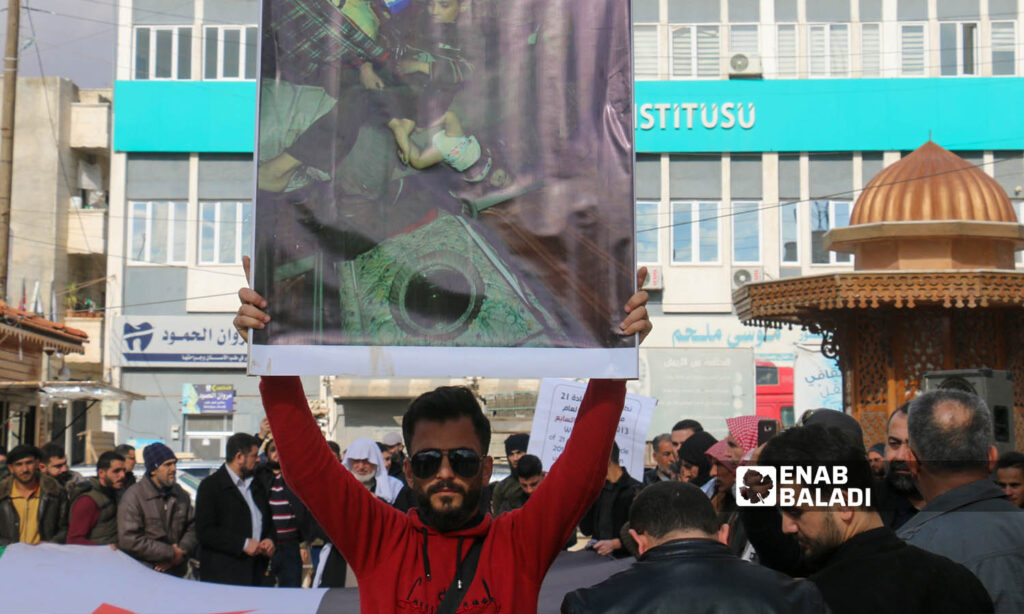The Syrian Network for Human Rights (SNHR) urged the new administration in Syria to cooperate with the Organization for the Prohibition of Chemical Weapons (OPCW) and allow it to uncover the remaining chemical weapons to ensure their complete destruction.
The network indicated in a report today, Tuesday, December 17, the importance of the caretaker government’s commitment in Syria to the laws and agreements that prohibit the production, storage, or use of chemical weapons.
Following the fall of the Syrian regime, the OPCW stated on December 9 that it is monitoring the situation in Syria “with special attention.”
It confirmed its commitment to uncovering all sites of chemical weapons in Syria and destroying them.
Syria joined the OPCW in 2013, and the ousted regime at that time stated that it had disclosed all sites of its chemical stockpile, preparing for their safe transport and destruction.
Despite the regime’s announcement, the locations of the remaining quantities of chemical weapons or materials used to produce these weapons remain unknown.
The previous regime faced accusations of using chemical weapons to bomb areas populated by civilians and always responded with denial, accusing its opponents or the Islamic State group of using these weapons.
The UN organization stated that the previous regime, over 11 years, did not provide sufficient and reliable information about chemical weapons in Syria.
The OPCW added that it documented, along with other independent international bodies, the use of chemical materials as weapons after the previous regime joined the organization in 2013.
Reassurances
The OPCW demanded that Syria adhere to the agreements prohibiting chemical weapons and announce the locations of their storage.
In turn, the Syrian Salvation Government (SSG), which is currently the nucleus of the caretaker government in Syria, issued reassurances to the international community regarding the chemical weapons present in Syria on December 7.
The Political Affairs Administration expressed its readiness to cooperate with the international community concerning the weapons and sensitive sites, seeking to provide guarantees against the use of prohibited weapons.
It emphasized that there is no intention or desire to use chemical weapons or weapons of mass destruction under any circumstances, considering their use a “crime against humanity.”
The Salvation Government pointed out that it is dealing with all military sites that were under the control of the previous regime “with the utmost responsibility,” asserting that it will not allow them to fall into “irresponsible hands,” as it put it.
The head of the Military Operations Administration, Ahmed al-Sharaa (Abu Mohammad al-Jolani), told Reuters that the new administration will cooperate with international organizations to secure chemical weapons sites.
US welcomes and Israel strikes
For its part, the United States welcomed, through Pentagon spokesperson Sabrina Singh, the statements made by al-Sharaa regarding chemical weapons sites.
Singh stated, “We welcome this kind of rhetoric, but we want actions alongside words,” adding that her country is focused on ensuring that these weapons do not fall into the wrong hands.
Following the fall of Bashar al-Assad, Israel targeted numerous sites that belonged to the Syrian army during the previous regime, claiming it has carried out over 500 airstrikes to destroy the army’s capabilities.
On December 9, Axios reported that US officials stated that Washington is working with other countries in the Middle East to prevent chemical weapons in Syria from falling into the “wrong hands.”
Axios added that the US and its allies are concerned that the collapse of the regime’s army and other security forces and the spread of chaos will allow “terrorist groups” to seize dangerous weapons that were held by the regime.
Bloodless massacres
During its rule, the Syrian regime used chemical weapons against civilians in various places in Syria, notably in the Damascus countryside.
On August 21, 2013, the Syrian regime carried out an attack with sarin gas targeting several towns in Eastern Ghouta and the town of Ma’adamiya in Western Ghouta, bombing it with more than 10 rockets.
The chemical attacks resulted in the death of 1,119 civilians and 25 fighters from the opposition, and injured 5,935 others, according to what the SNHR documented.
On April 4, 2017, the previous regime bombed the city of Khan Sheikhoun with sarin gas, resulting in the death of 91 civilians, including 32 children and 23 women, and injuring 520 others, according to documentation by the SNHR.
About six months after the Khan Sheikhoun incident, a report prepared by the OPCW-UN Joint Investigative Mechanism confirmed the responsibility of the Syrian regime for releasing sarin gas on Khan Sheikhoun.

